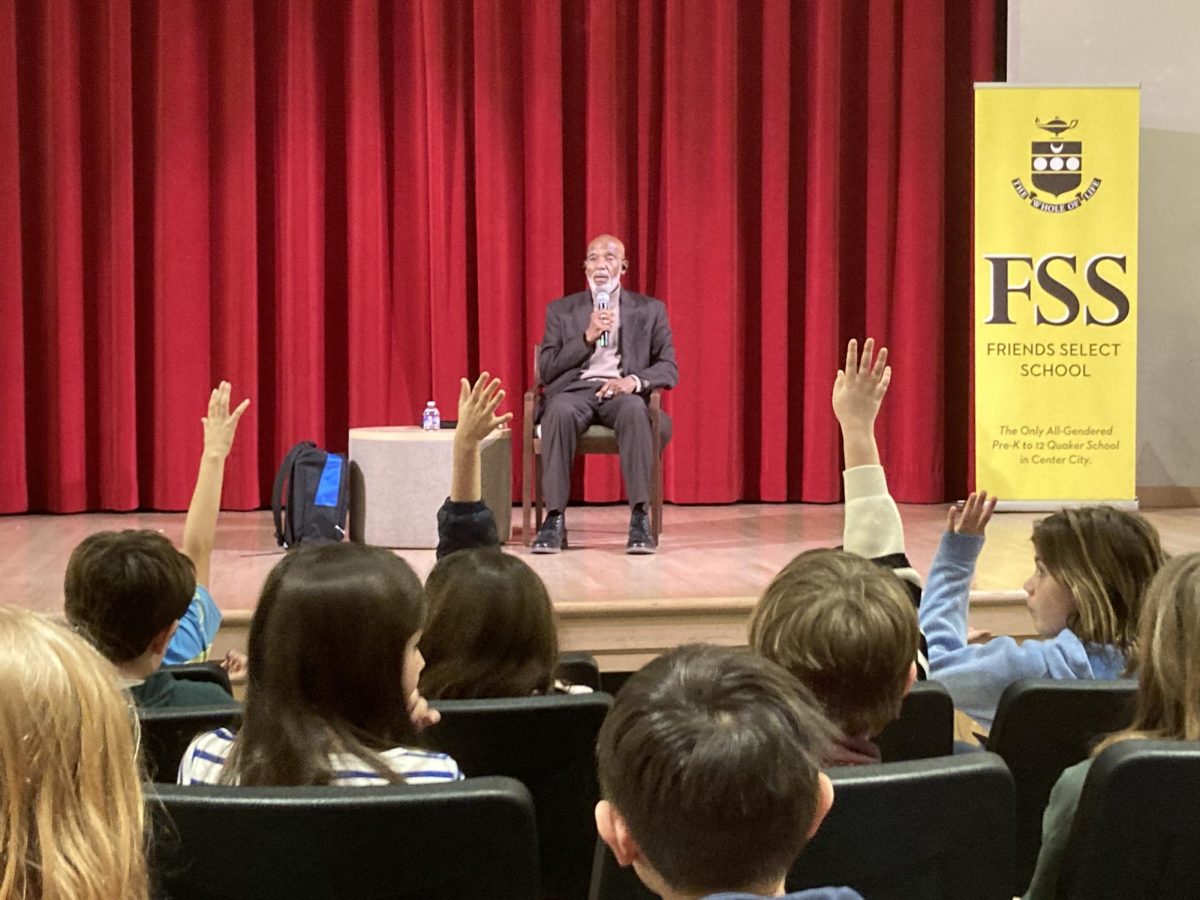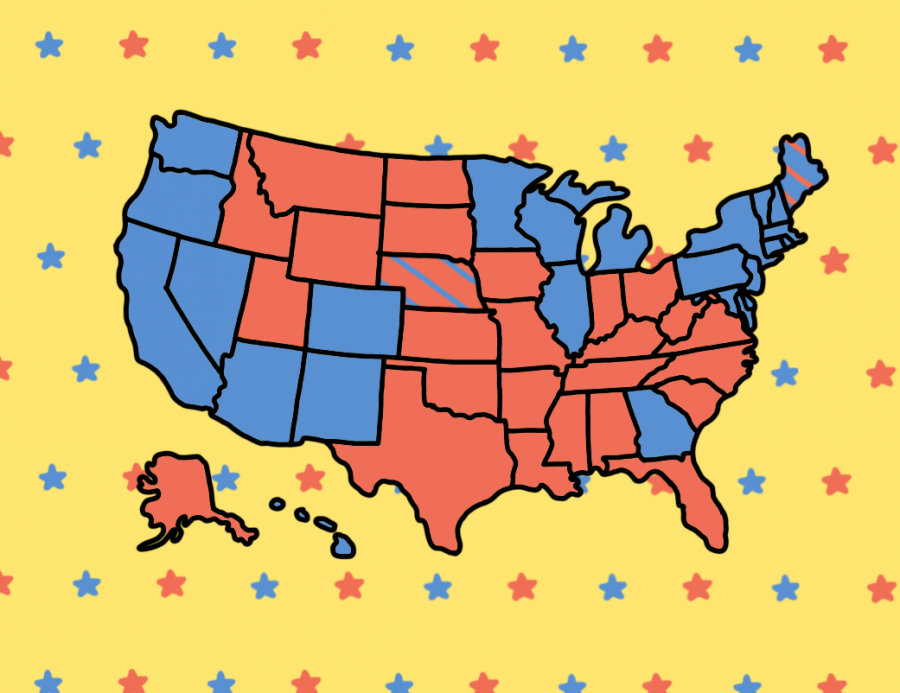Opinion: It’s Time for a National Popular Vote
This illustration by photographer Annie Rupertus ’21 represents the 2020 Presidential Election. The color-coded states show the Electoral College results. This image was made using Autodesk Sketchbook.
November 6th, 2012. Fourth-grade me sits cross-legged on the couch, blue and red crayons in hand. Each time electoral results from a new state flash across the television screen, I carefully color it in on the printed out map in front of me. At age nine, I had just learned about the Electoral College. What I didn’t know yet was that this so-called staple of American democracy is an utterly ridiculous and outdated system. It’s time for presidents to be elected not by electors, and not by the House of Representatives, but by the American people.
In order to understand the Electoral College, one must first take a look at the reasons for its implementation, which was decided on during the 1787 Constitutional Convention.1 The framers of the Constitution devised a system for picking the president that involved assigning a certain number of electors to each state based on that state’s number of representatives in Congress (two Senators, plus the number of Representatives in the House, which is based on population size).2 With the age of mass communication and major political parties far off on the horizon, the founders were worried that Americans would lack sufficient information to choose a presidential candidate.3 Additionally, some southern politicians promoted the Electoral College because it allowed them to count enslaved populations as three-fifths of a person when calculating their number of electoral votes. This would increase those states’ political power, even though enslaved people didn’t have suffrage.4
Now, in every state but two (Maine and Nebraska), all of a state’s electors cast votes for whichever candidate won the state, even if the victory was only by a very small margin.5 What results, in practice, is a situation where many votes don’t actually “matter.” For example, in a blue state like California, an individual Republican vote is effectively worthless, because California will almost undoubtedly end up allotting all 55 of its electoral votes to the democratic candidate. Stanford sociology professor Doug McAdam reports that in 2012, only about a fifth of American voters had any true electoral impact due to the winner-take-all system.6
This isn’t the only downside to the Electoral College; additionally, this arrangement can sometimes allow for a president to be elected after losing the popular vote. This has happened multiple times since the Electoral College’s founding, including in 2016 when President Donald J. Trump won the presidency with 306 electoral votes, even though he didn’t gain the majority of individual votes.7 It’s absolutely nonsensical that someone who fewer people voted for could be (and has been!) given the most important job in the country.
Another unfortunate outcome of the Electoral College is an imbalance of influence. Small states — for example, Wyoming, which has three electoral votes8 for about 579,000 people9 — have a disproportionate impact on the outcome of the election because of those two senators that every state gets regardless of size. California has over 39,512,000 people10 — it’s about 68 times as big as Wyoming, and yet California only has about 18 times as many electoral votes. There’s no good reason for a smaller group of people to have more of a voice simply because of where they live.
The Electoral College needs to go, and I am not alone in having that sentiment. Over 700 proposals have been made to Congress to abolish or reform the Electoral College (that’s more than any other subject).11 Throughout history, thinkers have proposed various alternatives for electing a president.
One such idea, detailed in a recent Falcon article by my colleague Peter Ryan ‘21,12 is to delegate the responsibility for selecting the president to the U.S. House of Representatives. While I agree that the Electoral College should be abolished, I am adamantly opposed to the idea of election via the House.
The main problem with this proposal is that Congress is not truly representative of the American people. Issues like unequal voting rights, voter suppression, and lack of representation for marginalized groups — all stemming from the U.S.’s rich tradition of oppression — have led to a historically imbalanced House. Of the 11,040 individuals who have served as representatives in the House in U.S. history,13 325 were women (2.9%), and 75 were women of color (0.7%).14 Patsy Mink, the first woman of color in the House of Representatives, was only elected in 1964, almost 200 years after the country’s founding.15 Our current House speaker, Nancy Pelosi, became the first woman to hold that position when she was elected in 2007.16 The first openly LGBTQ+ Black members of Congress were just elected in 2020.17 While Congress is becoming more and more diverse, it is still significantly skewed. To get an idea of the current state of representation in the House, please refer to the table below comparing House representation and overall U.S. population demographics:
| Group: | Percent of House representatives in 2019: | Percent of U.S. population in 2019: |
| Women | 23.2% (101) | 50.8% |
| Women of color | 10.1% (44) | 19.9% |
| Black Americans | 12.0% (52) | 13.4% |
| Hispanic and/or Latinx Americans | 10.1% (44) | 18.5% |
| Asian and/or Pacific Islander Americans | 3.2% (14) | 6.1% |
| Indigenous Americans | 0.9% (4) | 1.3% |
Sources: Rutgers Center for American Women and Politics, Pew Research Center, Congressional Research Service, United States Census, Catalyst
These statistics show a clear imbalance with regards to racial and gender representation, and they don’t even begin to shed light on the class barrier. Anyone in Congress is a member of the elite and therefore not truly representative of their constituents. Such a drastic change as to allow the House to pick the president would require complete trust in those House members on the part of the American people — trust that doesn’t exist. I don’t trust our elected politicians, and according to the Pew Research Center, 80% of American adults don’t either.18 Moreover, leaving the election up to just 435 representatives would increase the likelihood of insider dealings and corruption.19 So why let this group of people make arguably one of the most important decisions in American government when we could let the people decide instead?
Some argue that Americans aren’t informed enough to make such crucial decisions, but I believe that this is also incorrect. Misinformation is common, but compared to the time of this country’s founding, people have more knowledge at their fingertips due to technological advances. Furthermore, and I know this is coming from a place of partisanship, I trust the American people to choose the right president because that’s what they’ve been doing for the last sixteen years.
This is paramount: in my opinion, Americans made the right choice this year when they chose President-Elect Joseph R. Biden by a margin of over seven million votes,20 just like they did in 2016 when former Secretary Hillary R. Clinton won the popular vote by almost three million votes,21 and in the two elections before that. I believe that they will continue to pick the right presidents.
What the U.S. needs is a simple solution: a national popular vote. This is the most direct way for the American people to decide on the president, and it allows for each citizen’s voice to be heard and assigned equal value. Proponents of the Electoral College say that we should stick to the current system because it allows smaller states to have a voice and forces candidates to seek support beyond just major cities,22 but these arguments lack logic. The Electoral College gives less populated states disproportionate power; states with more people should have more of an influence on the presidency. The United States is not simply 50 entities, it’s over 300 million individual people with their own beliefs — in other words, land doesn’t vote, people do. Furthermore, the idea that the Electoral College forces presidential candidates to spread their attention to more than only a few states is just incorrect; candidates mainly just focus their attention on swing states. In 2016, 94% of campaign events were in just 12 battleground states.23
Research shows that a national popular vote system is favored by 58% of U.S. adults.24 This alone should be enough to merit serious consideration of the arrangement. The fact that the majority of Americans support a direct popular vote, as well as the glaring advantages of the system, are proof that it’s time to institute it in place of the Electoral College.
Americans have argued about how to elect the president since the country’s founding. The outdated and inane Electoral College isn’t working; election via the House of Representatives is illogical. The answer is clear: the only suitable system is a national popular vote.
1 https://www.britannica.com/event/Constitutional-Convention
2 https://www.britannica.com/topic/electoral-college
3 https://www.theatlantic.com/ideas/archive/2019/11/five-common-misconceptions-about-electoral-college/602596/
4 https://time.com/4558510/electoral-college-history-slavery/
5 https://www.britannica.com/topic/electoral-college
6 https://news.stanford.edu/2016/04/08/electoral-college-bad-040816/
7 https://www.nytimes.com/elections/2016/results/president
8 https://www.britannica.com/topic/electoral-college/U-S-electoral-votes
9 https://www.census.gov/quickfacts/fact/table/CA,WY,US/PST045219
10 https://www.census.gov/quickfacts/fact/table/CA,WY,US/PST045219
11 https://www.archives.gov/electoral-college/history
12 https://fssfalcon.org/3489/opinion/no-electoral-college-no-popular-vote-let-congress-elect-the-president/
13 https://history.house.gov/Institution/Total-Members/Total-Members/
14 https://fas.org/sgp/crs/misc/R43244.pdf
15 https://history.house.gov/Exhibitions-and-Publications/WIC/Historical-Data/Women-of-Color-in-Congress/
16 https://history.house.gov/Institution/Firsts-Milestones/Speaker-Fast-Facts/
17 https://www.nbcnews.com/feature/nbc-out/mondaire-jones-joins-ritchie-torres-first-gay-black-men-elected-n1246693
18 https://www.pewresearch.org/politics/2020/09/14/americans-views-of-government-low-trust-but-some-positive-performance-ratings/
19 https://www.brookings.edu/policy2020/bigideas/its-time-to-abolish-the-electoral-college/
20 https://www.nytimes.com/interactive/2020/11/03/us/elections/results-president.html
21 https://www.nytimes.com/elections/2016/results/president
22 https://www.britannica.com/topic/electoral-college
23 https://www.nationalpopularvote.com/campaign-events-2016
24 https://www.pewresearch.org/fact-tank/2020/03/13/a-majority-of-americans-continue-to-favor-replacing-electoral-college-with-a-nationwide-popular-vote/























